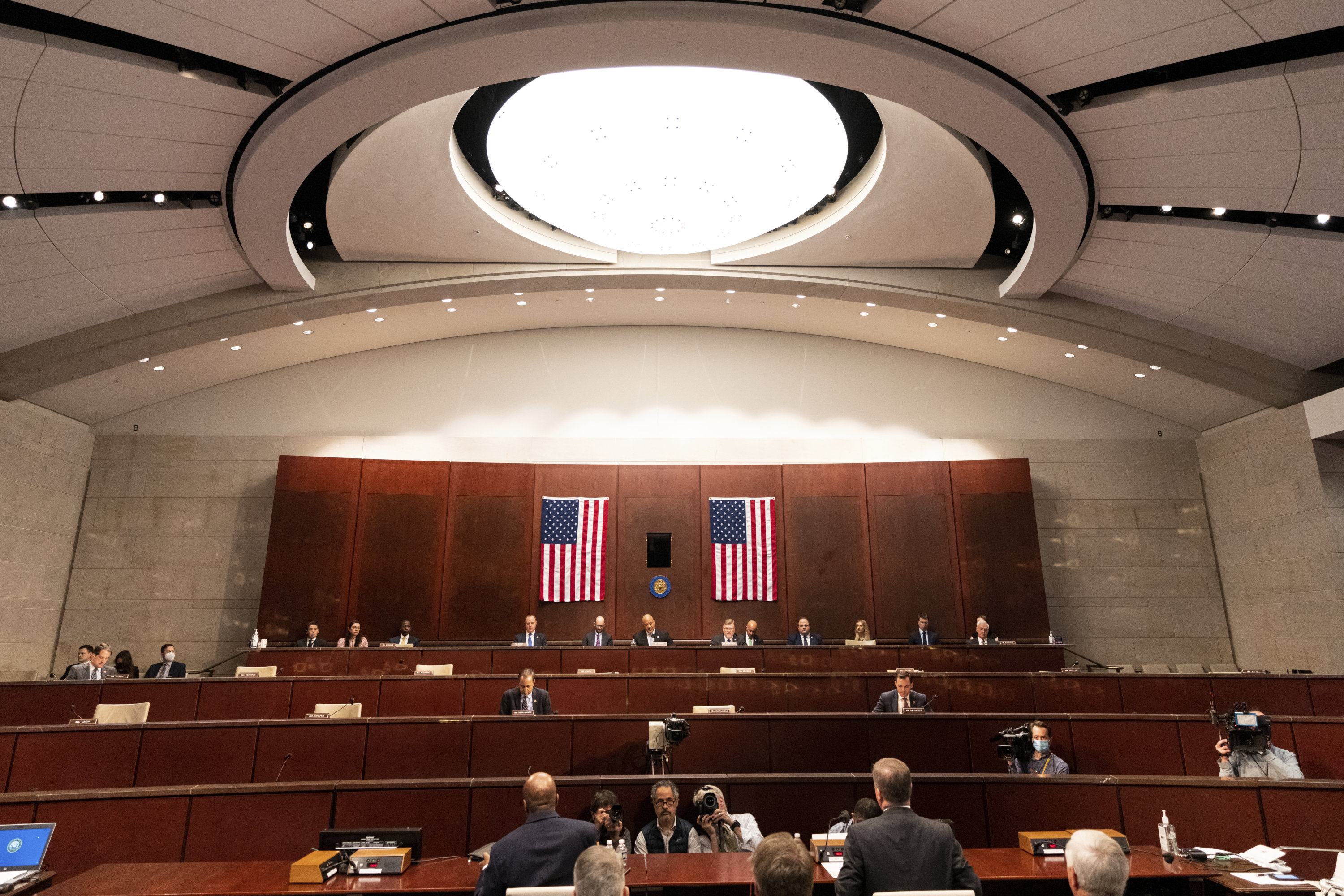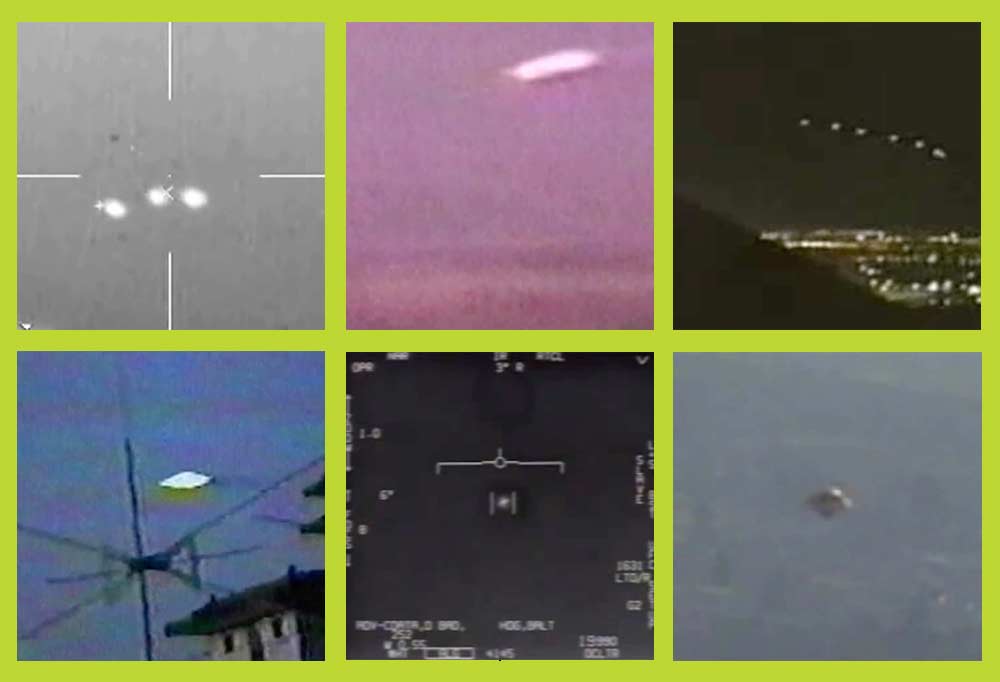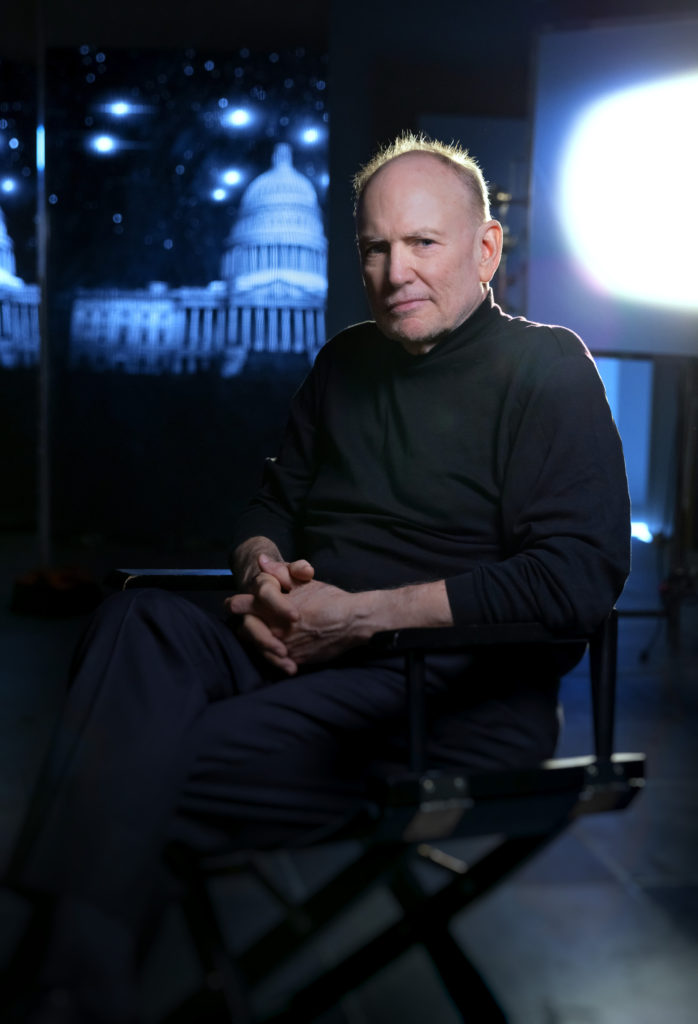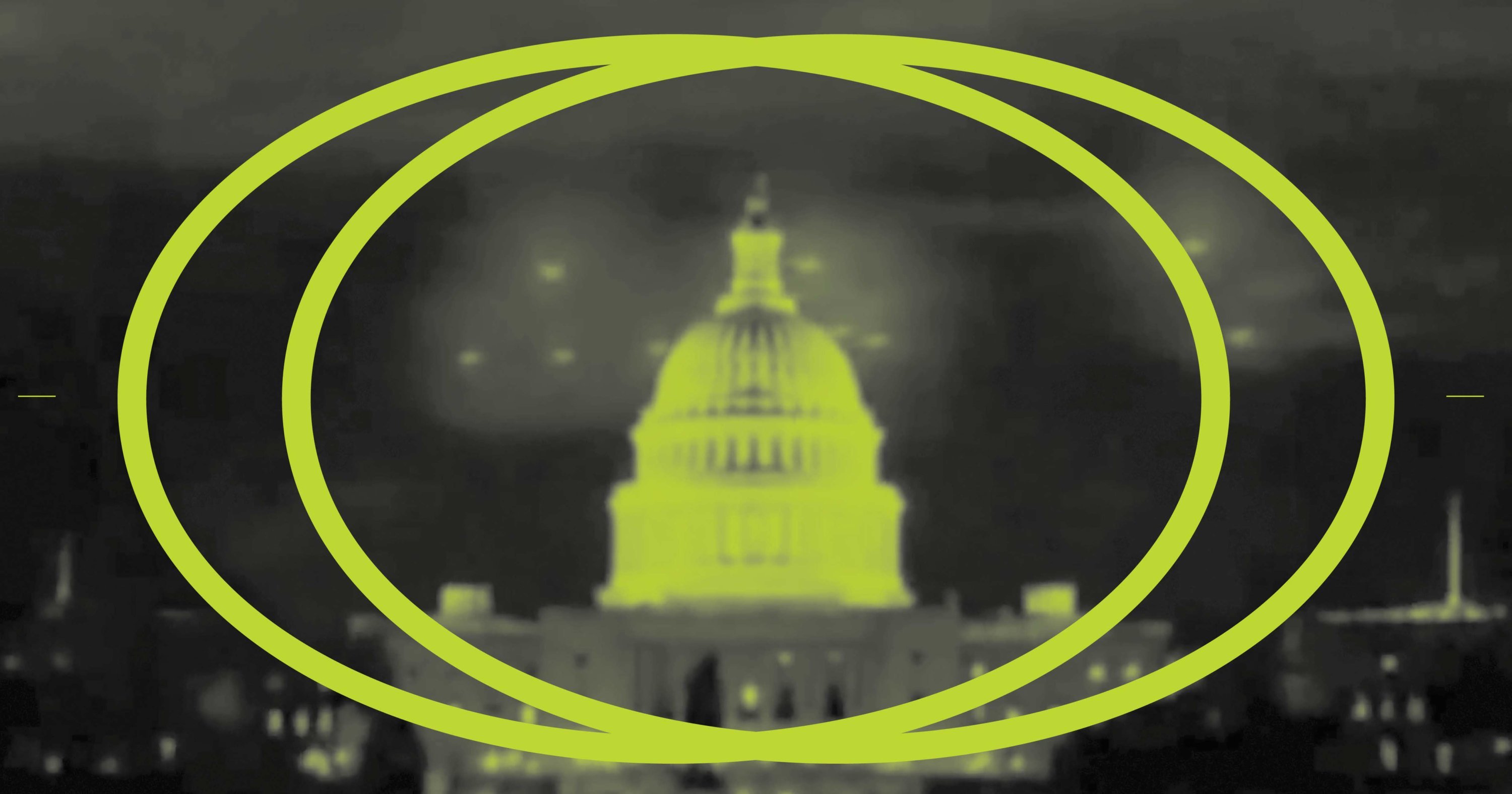On a Tuesday morning in mid-May, Stephen Bassett flipped open his laptop, logged on to YouTube, and watched live-streamed coverage of America’s elected representatives doing something he’d waited years to see. Over the next hour and a half, he stared at his 43-inch LCD monitor and observed stern-faced military officials in a congressional hearing room answer lawmakers’ questions about the unidentified aerial phenomena, or UAPs—another term for UFOs—that servicemembers had encountered in recent years. As the proceedings got underway, one of the Pentagon higher-ups played recently declassified footage showing a mysterious object darting across the sky. “For too long, the stigma associated with UAPs has gotten in the way of good intelligence analysis,” André Carson, the Democratic congressman from Indiana who chairs the House Intelligence subcommittee that had organized the event, told the audience. “Today, we know better. UAPs are unexplained, it’s true. But they are real.”

For Bassett, this first public congressional hearing on UFOs in more than 50 years was a milestone. As DC’s first registered UFO lobbyist, he’d spent more than a quarter century pleading for lawmakers and the administration to stop snickering at the issue. Yet as he watched official Washington finally take the topic seriously, an uneasy feeling struck him. “It’s that anxiety that you get when you’re getting close to the finish line,” he says, “but it’s still not clear it’s a done deal.”
Though long dismissed as the delusions of science fiction, UFOs have emerged as a serious subject in the nation’s capital. Over the past five years, the Navy has begun establishing a more formal reporting process for pilots who spot mysterious objects in the sky, intelligence agencies have publicly documented 144 cases of unidentified aircraft, and both the Department of Defense and NASA have launched efforts to help make sense of it all. Federal intelligence officials have no explanation for the vast majority of the sightings, and some are concerned that the strange objects could be advanced technology developed by adversaries such as Russia or China.
But while encouraged that Congress was willing to hold a public hearing, Bassett is far from satisfied. The government, he insists, is still sitting on far bigger secrets, and he won’t stop pushing for answers until the White House makes a complete disclosure. “What is disclosure?” he says. “The President of the United States will publicly confirm the extraterrestrial presence is in fact real—[that] we are not alone in the universe.”
Bassett got into UFO activism 26 years earlier, during a period of personal despair. After earning a physics degree from what’s now called Eckerd College in St. Petersburg, Florida, in 1970, he began bouncing from one job to the next—EPA official, tennis pro, business consultant—while struggling to find his life’s purpose. By the mid-1990s, he was 49 years old, unmarried, and unhappy. “You realize if you don’t do something proactive,” he says, “you’re just going to fade away, and you’ll be gone.”
It was around this time that Bassett read a canonical work of UFO research, Abduction by John Mack. Bassett had long maintained a peripheral interest in the subject of extraterrestrials, devouring science fiction as a child and following stories of alien contact that occasionally popped up in the media. But it wasn’t until he reviewed the numerous accounts of supposed alien encounters explored by Mack—a Harvard psychiatry professor and Pulitzer Prize–winning author—that he decided to pursue the subject more seriously. He secured a volunteer position with Mack’s organization, the Program for Extraordinary Experience Research, and in 1996 set off on the more-than-3,000-mile drive from his home in San Luis Obispo, California, to its headquarters in Boston.

Along the way, Bassett stopped in Roswell, New Mexico, site of the famous 1947 crash that left metallic wreckage of something—some say it was a weather balloon, others insist it was a UFO—littered across a ranch. After passing the International UFO Museum, Bassett drove into a vacant expanse of desert and experienced an intense revelation. “I’m just looking at this desert and I’m going, ‘We have no idea what is out there,’ ” he recalls. “I’m realizing there are massive secrets out there in the possession of our US government that have been contained from us.”
For Bassett, suspicion of government was an acquired instinct. He’d grown up as the son of a Navy officer, relocating every few years—to California, Florida, and the Philippines, among other places—when his father was reassigned. “No one place, no one home, no friends that last—that kind of life,” he says. During his senior year of high school, he was accepted into the Air Force Academy but failed the physical due to an improperly wired EKG machine. The Vietnam War forever ruptured Bassett’s faith in the government, and he began taking part in antiwar protests. Now, as he cruised across New Mexico toward Massachusetts, he felt alive for the first time in years. “I was on a quest,” he says.
Arriving in Boston in early 1996, Bassett took a desk in the development office of the Program for Extraordinary Experience Research. He grew increasingly frustrated that journalists, government officials, and academics continued to laugh off extraterrestrials despite everything he’d read. The citizen activists of the UFO community, he argued, had obtained enough material “to prove the extraterrestrial presence ten times over.” The problem, he concluded, wasn’t a lack of scientific research. Rather, it was the federal government’s refusal to release evidence he was sure it possessed that would confirm—once and for all—that aliens were real.
At the conclusion of his five-month stint in Boston, he moved to the Washington area and founded Paradigm Research Group, an organization dedicated to advocating “an end to a government imposed truth embargo of the facts surrounding an extraterrestrial presence engaging the human race.”
It was a shoestring affair. With no regular income or financial backing, Bassett moved into his aunt’s home in Bethesda, turned her attic into his headquarters, and began looking for ways to bring credibility to his endeavor. “In Washington, no one takes your issue seriously unless you have a lobbyist, a PAC, and press clippings,” he once told a reporter. “My job is to make sure we have all those things.”
Bassett grew frustrated that journalists, government officials, and academics continued to laugh off extraterrestrials despite everything he’d read. “There are massive secrets in the possession of our government.”
So, in the fall of 1996, Bassett submitted his official lobbying registration forms with Congress, which noted that he’d be pressing for public hearings on UFO issues as well as “formal acknowledgment by the U.S. government of an extraterrestrial presence.” He then established a fundraising enterprise—the Extraterrestrial Phenomena Political Action Committee, or X-PPAC—to provide citizens with a “long-needed vehicle to direct their concerns to government in unambiguous, unavoidable terms regarding the cover up of UFO/ET evidence.” With his DC credentials in hand, Bassett did what any other influence peddler would do: He began working to line up meetings with congressional offices.
But Bassett, of course, wasn’t just another lobbyist. The overwhelming majority of congressional offices had no interest in discussing aliens with him, and the few meetings he did secure were with junior staffers or interns. Not even Steven Schiff, the New Mexico representative who once called for a federal inquiry into the government’s response to the Roswell incident, would make time for him. “We have instituted what we refer to as the, quote, no-UFO media diet,” the congressman’s spokesman told a Legal Times journalist who was writing about Bassett in 1997.
It soon dawned on Bassett that this “ridicule curtain” would make it impossible for him to engage in the sort of grip-and-grin lobbying that traditional K Street operators practiced. So he decided to shift tactics. Instead of directly lobbying officials on Capitol Hill, he began working to reach them through the media. “You want to get an issue into Congress?” he says. “Get it into the Washington Post.”
While policymakers had no interest in talking to Bassett, the press corps couldn’t get enough of him. Once his lobbying registration forms became public, journalists began reaching out to interview Washington’s first-ever UFO lobbyist. Stories of his work appeared in the Post, the New York Times, USA Today, and the Chicago Tribune, among many other publications. As he became more comfortable with reporters, Bassett began speaking in media-friendly sound bites. “It is not about lights in the sky,” he told the Montgomery County Sentinel in 2007. “It is about lies on the ground.”
All the while, he was pursuing every available avenue to rally support. Shortly after arriving in Washington, Bassett helped coordinate a petition drive demanding that lawmakers hold hearings on extraterrestrials. In 2002, he gathered the requisite 5,000 signatures to run as an Independent in the 2002 campaign for a congressional seat representing parts of Montgomery County, emerging as the first person in history to appear on a federal ballot with an alien-life agenda. (He received less than 1 percent of the vote.)
In 2011, when the Obama administration created an online destination to solicit the public’s input as to which issues to address, Bassett’s petition urging the President to come clean about aliens received enough signatures to require an official response. “The U.S. government has no evidence that any life exists outside our planet or that an extraterrestrial presence has contacted or engaged any member of the human race,” Phil Larson, a senior adviser in the White House’s science-and-technology office, said in a blog post. In 2013, Bassett held a mock congressional hearing on UFOs at the National Press Club featuring six former Congress members.
Though he attracted plenty of press coverage, Bassett’s efforts produced more chuckles than results. “Let me check in with the mother ship,” a Hillary Clinton spokesman replied in 2007 to a question when asked about the then New York senator’s views on UFO disclosure. “If they start taking contributions from aliens, that’s not legal,” the spokesman for the Center for Responsive Politics, a watchdog group, once joked about Bassett’s PAC. “We’ll be watching the addresses of their donors carefully.”

Nevertheless, Bassett was always sure he was on the brink of convincing Washington to wake up to the reality of extraterrestrials. “He would say, ‘No, I think this is the year. I think this is the year we’re going to get this done,’ ” says Daniel Sheehan, a public-interest lawyer who has done work on UFO-related matters. “There was this existential dimension to his approach, that he could sort of will this into happening.”
It was a solitary mission. Bassett is single and has no children, and his closest confidants are other UFO devotees he sees at conferences or chats with on message boards. Says Bassett: “They’re my family, I guess you could say.”
Fellow UFO enthusiasts marveled at Bassett’s persistence despite his being ridiculed, rejected, and ignored over more than two decades. He received a small inheritance when his aunt died, but Bassett’s work doesn’t generate any income and he has no other job. Without the means to pay for housing, he has spent the past 25 years living with family members or surviving off the generosity of “supporters”—UFO advocates who provide him with cash or a place to stay. “That was the thing that amazed me the most,” says UFO researcher Grant Cameron. “Most people would just get up and say, ‘I’ve got to make a living here.’ He never did. He never gave up.”
During the first decade and a half of the 21st century, says UFO researcher Richard Dolan, “Steve Bassett was truly one of the leading voices and inspirations for many people within the UFO field to keep the dream going.”
Like many other dreams in Washington, Bassett’s suffered a profound setback in 2016. Over the course of his years in DC, he’d come to believe that the Clinton political machine possessed an ongoing interest in UFOs. Back in the 1990s, for example, billionaire Laurance Rockefeller had met with top officials in Bill Clinton’s administration as part of a campaign to convince the White House to disclose government secrets about UFOs or extraterrestrial life. In 2002, John Podesta—who served as Bill Clinton’s chief of staff and would go on to chair Hillary Clinton’s 2016 presidential effort—appeared at a National Press Club event where he pressed for the Bush administration to release similar records. And during the 2016 race, Hillary Clinton expressed a willingness to make such materials public, should she assume the Oval Office. “I want to open the files as much as we can,” she told a reporter. “There’s enough stories out there that I don’t think everybody is just sitting in their kitchen making them up,” Clinton continued.
As November 2016 approached, Bassett was convinced that his life’s work was about to bear fruit. “Hillary Clinton was going to be the disclosure President,” he says, “making what is easily the most important announcement in history.”
“Hell,” he continued, “they’d probably build a monument to her on the Mall.”
Trump’s surprise victory left Bassett shattered and depressed. “It’s like a death in the family,” he says. As a result of the election, his financial support in the US dried up and he decided to move in with another benefactor in London. As he left the country in April 2017, the then 70-year-old Bassett thought everything he’d worked for might have just gone down the drain. “I was worried about the death of the movement itself,” he says.
Less than a year after he retreated to London, Bassett’s hopes were revived by a bombshell revelation.
In 2017, the New York Times reported that military-intelligence officials had spent the prior ten years running an essentially secret $22 million initiative to look into reports of mysterious aircraft. The Pentagon’s Advanced Aerospace Threat Identification Program—which was created with the help of a funding request made by then Democratic senator Harry Reid of Nevada—compiled accounts of military personnel who said they’d witnessed flying objects hovering in the air or traveling at extraordinary speeds despite not appearing to have traditional jet-propulsion systems. In the wake of the story, official Washington adopted a more open-minded posture toward UFOs. “I want us to take it seriously, and have a process to take it seriously,” Florida Republican senator Marco Rubio said on 60 Minutes. In 2021, the Director of National Intelligence released a report documenting 144 sightings of unidentified aircraft, and House lawmakers soon made plans for a public hearing.
With the political environment shifting in his favor, Bassett returned to Washington to restart his crusade. But while UFOs had become the subject of sober-minded consideration, aliens remained a fringy proposition. During his appearance on Capitol Hill, Scott Bray, deputy director of the Navy’s intelligence office, told members of Congress there was no evidence in any of the UAP reports he’d seen pointing to “anything non-terrestrial in origin.”
Bassett remains undeterred. The “official position of the US government is not in fact what the US government knows about this issue,” he says. “That is just the position they are prepared to put forward now.”
Fellow UFO enthusiasts marveled at Bassett’s persistence despite being ridiculed, rejected, and ignored over more than two decades. His work doesn’t generate any income. He has spent the past 25 years surviving off the generosity of supporters.
Recent polling suggests that the public is open to the possibility of extraterrestrials—a 2021 survey by the Pew Research Center found that nearly two-thirds of Americans said it’s their best guess that there’s intelligent life elsewhere in the universe.
In an effort to pressure Washington to confirm the existence of aliens, Bassett is launching a new endeavor. He has teamed up with a Hollywood production company to create a streaming web series featuring interviews and commentary about UFOs and extraterrestrials. In the series, which at press time was scheduled to be released in July, Bassett interviews prominent figures in the UFO community from studios in Glendale, California, and the National Press Building in DC. It’s his hope that the exposure he receives from the project will open doors for him in Congress. “It is going to get me access to individuals and also probably much more media coverage,” Bassett says. “And it eventually gets to the point where, okay, people are going to take your phone calls, they’re going to take your meetings.”
Should this increased lobbying clout materialize, Bassett intends to keep putting pressure on Congress to hold additional hearings on UFOs. “If these hearings are held relatively close together—not weeks and weeks apart—the President could be in a position to kind of end this [truth] embargo during the summer, months before the [midterm] election,” he says. “That is what could happen. That is what should happen.”
This article appears in the August 2022 issue of Washingtonian.
